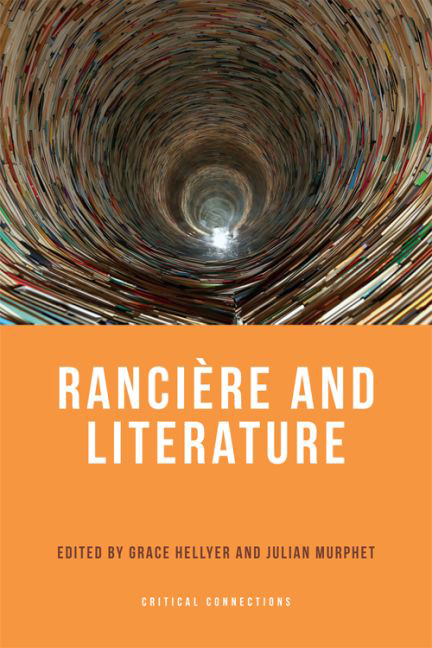Book contents
- Frontmatter
- Contents
- Acknowledgements
- Notes on Contributors
- Introduction: Rancière and Literature
- SECTION I Coordinates
- 1 Fictions of Time
- 2 Jacques Rancière in the Forest of Signs: Indiscipline, Figurality and Translation
- 3 Rancière and Tragedy
- 4 Rancière Lost: On John Milton and Aesthetics
- 5 ‘A New Mode of the Existence of Truth’: Rancière and the Beginnings of Modernity 1780–1830
- SECTION II Realisms
- SECTION III Contemporaneities
- Index
1 - Fictions of Time
from SECTION I - Coordinates
Published online by Cambridge University Press: 15 September 2017
- Frontmatter
- Contents
- Acknowledgements
- Notes on Contributors
- Introduction: Rancière and Literature
- SECTION I Coordinates
- 1 Fictions of Time
- 2 Jacques Rancière in the Forest of Signs: Indiscipline, Figurality and Translation
- 3 Rancière and Tragedy
- 4 Rancière Lost: On John Milton and Aesthetics
- 5 ‘A New Mode of the Existence of Truth’: Rancière and the Beginnings of Modernity 1780–1830
- SECTION II Realisms
- SECTION III Contemporaneities
- Index
Summary
First, some preliminary remarks about the notion of fiction. Fiction does not mean the invention of imaginary beings in contrast with solid reality. Fiction is a structure of rationality that is required wherever a sense of reality must be produced. It is firstly a form of presentation of things that cuts out a frame and places elements within it so as to compose a situation and make it perceptible. It can be a look cast through a window by a character in a novel or in a film. It can be the report made by an editorialist in a newsreel, telling us, for instance, that the French are anxious about the future or that Europe is prey to doubt. The point is not whether the description is true or not. We are not behind the window and we will never meet a character called ‘the French’. The point is about the sense of reality produced by the cutting out of the scene, the identification of its elements and the modality of the description. Politicians, journalists or social scientists must use fictions, just like novelists, whenever they have to say: this is the situation, these are the elements that compose it. They also need it to tell whence the situation comes, what its elements make possible and what future will follow from it. This is the second aspect of the rationality of fiction: it is a form of linkage between events that makes them coexist or follow one another, establishes causal connections between them, makes sense of that connection and gives to that connection the modality of the real, the possible or the necessary. The connection may simply be the fact that a woman in a novel commits suicide because she has got into debt and cannot reimburse her creditors.
- Type
- Chapter
- Information
- Rancière and Literature , pp. 25 - 41Publisher: Edinburgh University PressPrint publication year: 2016



